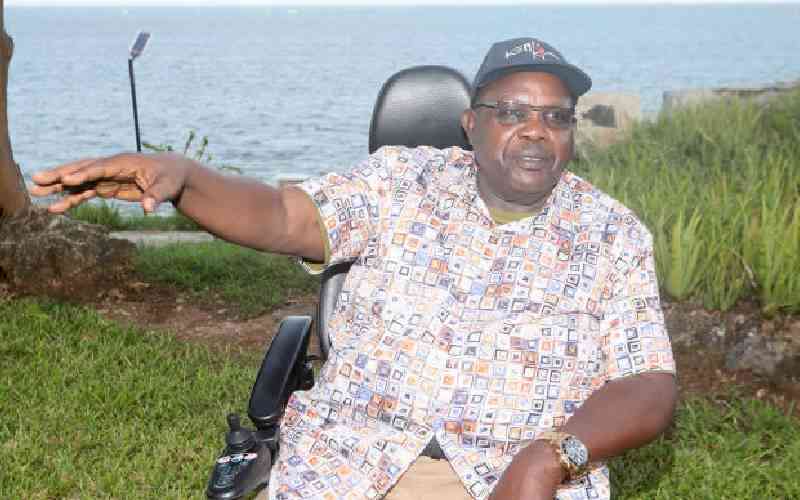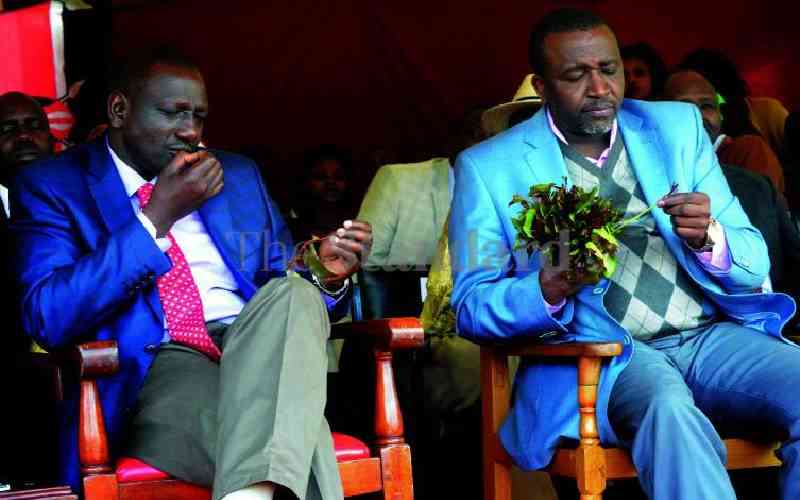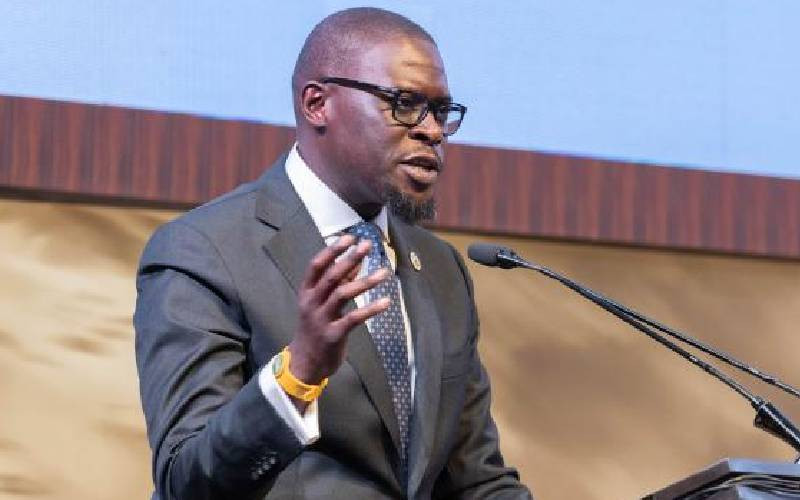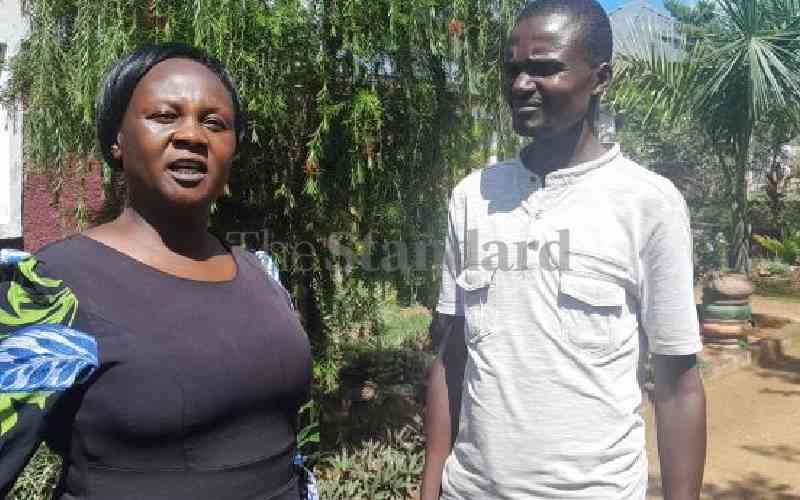Crooks from the Ministry of Health officials, Kenya Revenue Authority and rogue businessmen from China tried stealing donated Covid-19 kits for Kenyan health workers.
Investigations by The Standard have revealed an intricate scheme that involves possible collusion between Chinese businessmen, government officers and other local operatives to steal medical emergency goods worth millions of shillings, with the hope of selling the same products to hospitals and government at huge profit.
The groundwork for the attempted heist started just three weeks after Kenya announced the first Covid-19 case on March 12. As the country struggled to understand the disease and adopt measures to contain its spread, a number of countries offered to donate key medical equipment.
Frontline workers
Top among these was China, the first country to be hit by the pandemic. On April 5, Ambassador Sarah Serem of the Kenyan embassy in China received a consignment of medical supplies for frontline workers.
The embassy wrote to the Ministry of Foreign Affairs as well as the Ministry of Health with details of received donations. The letter was signed by Edwin Limo on behalf of the ambassador.
Fifteen days later, the donation arrived at the Jomo Kenyatta International Airport (JKIA) aboard a China Southern Airlines Flight number CZ633. But as soon as the plane touched down an individual, whom investigations have identified as Festus Odhiambo, with no known affiliation to either the Ministry of Health or the Ministry of Foreign Affairs or any government body, walked into the JKIA cargo terminal.
Odhiambo, who identified himself as an employee a clearing and fowarding company called Songhong Kenya Logistics Limited, was armed with a letter from another company, Fasomo Limited, that claimed ownership of the assorted medical equipment from China. The letter, by a Mr Dennis Manyasi who is named as a manager at Fasomo, had appointed him as the authorised clearing agent for the goods.
“We authorise Festus Odhiambo Origa to clear the goods on behalf of Fasomo Limited. Your assistance towards the matter will be highly appreciated,” reads the letter addressed to Swissport Kenya Limited, the CFS that was handling the goods.
The items included 6,000 pieces of N95 masks, 500 pieces of isolation gowns, 3,000 pieces of surgical masks, 500 pieces of surgical protective suits, 40 pieces of thermal thermometers and 85,000 pieces of normal masks.
But there was a catch. Official documents read that the goods had a demurrage fee of some Sh661,000. The processing officers at the time did not ask why a government-to-government donation needed to be cleared by a third party.
Undeterred, Fasomo Ltd made a Sh130,000 deposit towards the demurrage fee. At this time, The Kenya Union of Nurses and the Kenya Medical Practitioners and Dentists Union were up in arms. The nurses threatened to go on strike for lack of protective gear. The doctors exposed false promises by government on the availability of Personal Protective Equipment (PPE). A month after the first case, medical workers were still ill equipped to deal with the virus.
In the weeks that followed, dozens of nurses and doctors would contract the virus, putting the country at greater risk.
A day after Fasomo Limited paid the Sh130,000 deposit, the Ministry of Foreign Affairs sounded the alarm bell. The ministry had not received any official communication with regard to the arrival of the donations from China. It had been more than two weeks since the cargo left China by air.
“The ministry of Foreign Affairs invites your attention to the unaccounted donations from the People’s Republic of China which arrived at Jomo Kenyatta Airport on 21st-22nd April 2020. The items were sent by the Embassy of Kenya in China as a donation from private companies for use by the Kenya Government,” read a memo from the ministry.
Stay informed. Subscribe to our newsletter
According to the memo, the items were addressed to Dr Andrew Toro of the Ministry of Health. There was no mention of either Fasomo Limited or Odhiambo. When contacted, Dr Toro said the issue is under investigations and the only person who can talk about it is the PS or the investigator.
“I cannot make any further comments. I hope you understand my position,” Dr Toro told The Standard. When contacted, Odhiambo said his company was just acting on instruction by a client, Fasomo Limited.
“I work with Songhong Limited and Fasomo Limited is our client,” Odhiambo said. “We were notified by our CFS to act on behalf of Fasomo so we went to the CFS and collected the required documents. But the documents were missing some information so we requested our offices in China to follow this on our behalf,” he said.
The documents at the Nairobi CFS to Odhiambo’s company only had a letter of instruction from their client, Fasomo, it missed one crucial document, the official waybill.
A waybill is a document issued by a carrier giving details and instructions relating to the shipment of a consignment of goods. Typically, it will show the names of the consignor and consignee, the point of origin of the consignment, its destination, and route.
Almost a week later, Odhiambo received the waybill he had requested from China and with this, his company started the clearance of the goods. However, there was a hitch. Similar shipping details had been received at the Ministry of Health, but there was a telling difference. Every single item on the waybill was the same in the document received by Odhiambo and that in possession of Ministry of Health except the shipper and consignee details.
The document that Odhiambo presented to customs officials at JKIA had the shipper as Haoyang Trading Limited and the consignee as Fasomo Limited, while the document in possession of the Ministry of Health named the shipper as the Embassy of the Republic of Kenya and the consignee as Dr Toro, Head of Global Health Security at the ministry.
Haoyang Trading Company was incorporated on July 31, 2017 and was registered in Hong Kong. This duplication in the waybill raised a red flag within the Government Clearing Agency.
On May 4, officials from Fasomo showed up at customs with another waybill for the same consignment but custom officials, aware of the push and pull over the consignment, alerted the police.
While this is happening, officials from the Ministry of Health and Ministry of Foreign Affairs are at pains to explain to the public the slow disbursement of PPEs to health workers.
On May 12, the MFA Permanent Secretary Macharia Kamau announced in a press conference that his ministry had donated selected PPEs to MoH. However, crucially, key equipment such as N95 masks were missing from its list of donations.
Tracing suspects
As soon as he left the steps of his office building where the press conference was held, Macharia wrote to Directorate of Criminal Intelligence Director George Kinoti requesting him to investigate the issues surrounding the China shipment. The letter was stamped ‘very urgent.’
“The ministry looks forward to expeditious investigations and subsequently to a conclusive outcome including holding to account all responsible persons and eliminating criminal networks at JKIA and Guangzhou City in China involved in the attempted theft of the items,” Macharia’s letter read in part.
Kinoti advised Macharia to authorise the clearance of the goods through the Government Clearing Agency for immediate use.
It took a month for this clearance to come into place. On June 12, MoH officials, led by the original consignee of the goods Dr Toro, accompanied investigators to JKIA to inspect and verify the consignment of the medical items.
But before Dr Toro and his team got to the consignment, two men, representing neither government nor Songhong Kenya Logistical company - Odhiambo’s employer- walked into JKIA for a last ditch attempt at securing the goods.
The two men provided a unverifiable payment receipt No 2116327 from Songhong Kenya Logistics Limited detailing a cash payment of Sh530,398 as a clearance of the initial demurrage fees.
Although making enquiries into a now active case, the men slip through hands of investigators. On Saturday June 13, the consignment leaves JKIA after verification by scene of crime officers and makes its way to the Kenya Medical Supplies Authority headquarters in Embakasi for storage.
As government dithers the infection numbers among doctors and public health officials stands at 84, according to data from the Kenya National Union of Nurses and the Kenya Medical Practitioners and Dentists Union. Health workers were intended to be the beneficiaries of the equipment that is still, two months later, under government lock and key.
Official records at the Registrar of Companies list Fasomo Limited’s postal address as PO Box 28883 registered at Nairobi’s City Square. Its physical address is provided as Venus Plaza along Mombasa Road. However, a spot-check revealed that no such offices exist. A building by that name could also not be found.
When called, a local Kenyan phone number listed on an official document presented as a waybill by Odhiambo’s Songhong Kenya Logistics Company that alleged their authorisation as appointed clearing agents for China-based Haoyang Trading Company was answered.
Although the receiver said they worked for Fasomo, the employee also told The Standard that they also worked for Songhong- Fasomo’s clearing agents. This points to the possibility that Fasomo and Songhong, the clearing agents, were either the same entity or were closely related.
When asked about the incident yesterday, Kagwe admitted that his office is aware of the attempted heist.
“We are aware that there was something like that and there is an ongoing investigation. I cannot talk about an ongoing investigation,” Kagwe said.
“These are thieves and I can’t speak for them. The law will take its course and we are going to have them arrested.”
 The Standard Group Plc is a
multi-media organization with investments in media platforms spanning newspaper
print operations, television, radio broadcasting, digital and online services. The
Standard Group is recognized as a leading multi-media house in Kenya with a key
influence in matters of national and international interest.
The Standard Group Plc is a
multi-media organization with investments in media platforms spanning newspaper
print operations, television, radio broadcasting, digital and online services. The
Standard Group is recognized as a leading multi-media house in Kenya with a key
influence in matters of national and international interest.
 The Standard Group Plc is a
multi-media organization with investments in media platforms spanning newspaper
print operations, television, radio broadcasting, digital and online services. The
Standard Group is recognized as a leading multi-media house in Kenya with a key
influence in matters of national and international interest.
The Standard Group Plc is a
multi-media organization with investments in media platforms spanning newspaper
print operations, television, radio broadcasting, digital and online services. The
Standard Group is recognized as a leading multi-media house in Kenya with a key
influence in matters of national and international interest.








